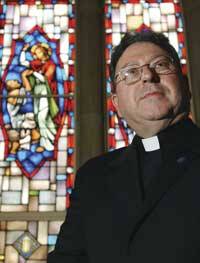As head of the Secretariat of Cultural Diversity at the U.S. Conference of Catholic Bishops, Allan Figueroa Deck, S.J., shared his views on this newly created entity during an interview with America in March. Father Deck, who is three-quarters Hispanic (“My mother was born in Mexico and my father in Arizona, but he was half-Mexican,” said Deck), is well qualified by virtue of his own background to work in the differing ethnic and cultural milieus of the U.S. church.
The Second Vatican Council deeply influenced Deck’s Jesuit and priestly vocation. “I graduated from high school the year the council began its first session, so my whole life’s context has been around Vatican II,” he said. “Now the church has entered a period of transition. New and emergent groups, such as Hispanics, Asian Pacific Islanders and…various migrant groups and refugees, as well as African-Americans, constitute the majority of the American Catholic Church. They are beginning to assume more responsibility and leadership than in the past.”
Father Deck emphasized the church’s ability to relate to diverse groups and to virtually all cultures as one of its primary strengths. “Paul VI reminded us in Evangelii Nuntiandi, and John Paul II in Ecclesia in America,” Deck noted, “that the church must be an expert in cultures, because that is how it will be effective in preaching the word of God.” He pointed out that in a January 2008 address to seminarians in Rome, Archbishop Wilton Gregory said, “To speak of a multicultural church is...a redundancy. Is there any other kind of church in our Catholic tradition?”
Diversity may also have a downside. Robert Putnam, a professor of public policy at Harvard’s John F. Kennedy School of Government, has suggested that in a country diversifying as rapidly as ours is, many Americans are “hunkering down” and sticking with those who have a similar cultural background, rather than readily accepting newcomers. But, Father Deck explained, “Catholic parishes and a number of the so-called [Protestant] megachurches have shown considerable creativity in creating spaces in which that negative effect is overcome.” Deck thinks that diversity can eventually become a positive factor: “For us Catholics diversity is a key issue, in that the encounter between the word of God and the particularity of different cultures is pivotal for the church’s mission; it’s exactly there that the word has to be rooted if the mission is to be fulfilled.” The church, Deck argues, must pay close attention to the ways in which people live out their values and transform those values in the light of Jesus’ message.
Ethnic ministry has become the main ministry of our time. “The demographics demonstrate this clearly,” said Father Deck. He alluded to the February 2008 Pew Forum survey of religion in America, which shows that the church is growing mostly through immigration. “Immigration has always been at the heart of the American experience,” Deck said. The church has responded to the needs of the different people who arrive here, in ways that respect their particularity while remaining faithful to the church’s own traditions and identity.
Immigration looms large at this point in the nation’s history, especially since the defeat of last summer’s immigration reform effort. The bishops have consistently supported reform and opposed the increasingly punitive approach of the Department of Homeland Security. They have also objected to the department’s practice of raiding workplaces and incarcerating immigrants prior to deportation.
The current political climate has heightened tensions around immigration. “Those who have studied American history and the public’s response to immigration,” said Father Deck, “know that it tends to go in cycles and that it has always been a love-hate relationship.” He referred to the waves of immigrants in the 19th, 20th and now the 21st century. Yet he thinks the conversation about immigration will eventually move toward moderation. The U.S. bishops have helped, by proclaiming the church’s teaching on the human rights of those most affected by immigration policy.
According to Father Deck, the church’s desire to relate to all cultures has been at work for several decades, as the U.S. church has become an amalgam of cultures: Latin American, Asian, African-American, Asian Pacific Islanders and others. The bishops are concerned that a distinct Catholic identity be maintained, that there be a true dialogue among the various cultures and that the church find ways of making a home for all. To this end, it is Father Deck’s hope that the new secretariat will “clearly articulate the catholicity and the universality of the Gospel message and the mission of the church.”








